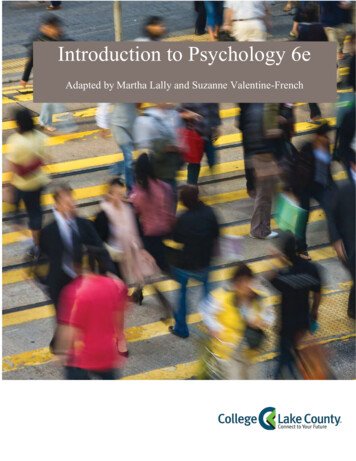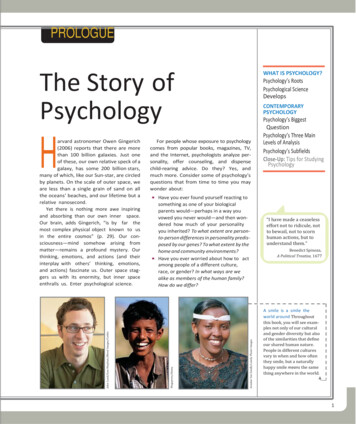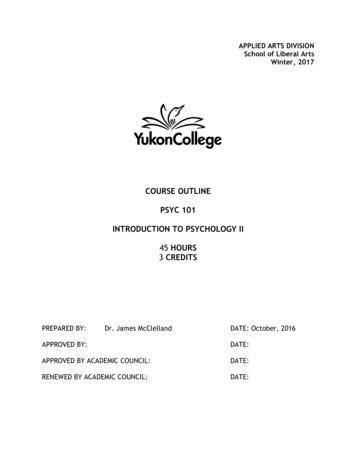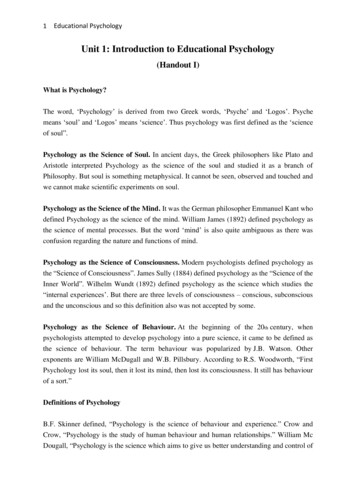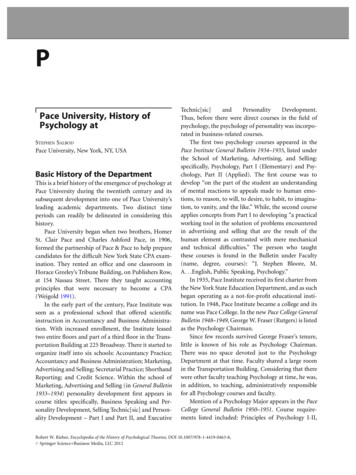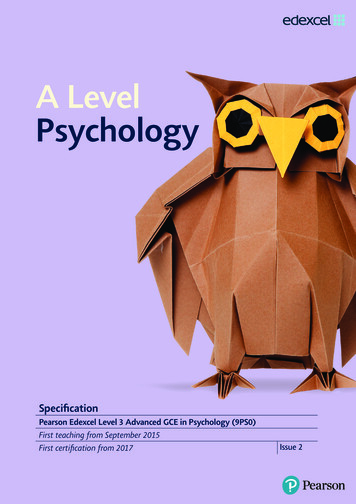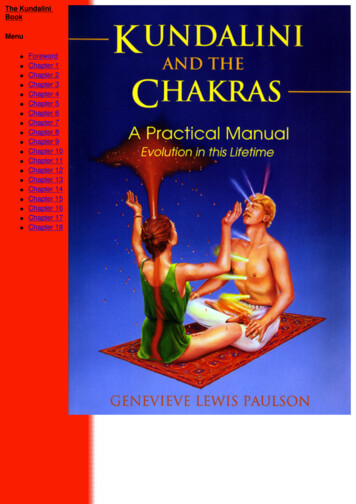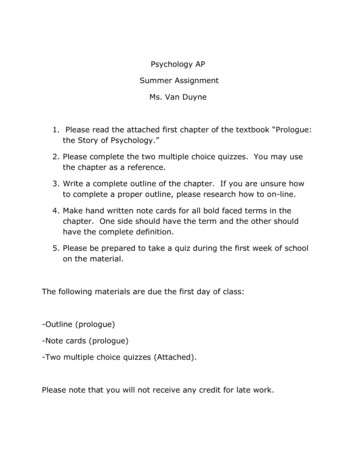
Transcription
Chapter1What is Psychology?After reading this chapter, you would be able to understand the nature and role of psychology in understanding mindand behaviour,state the growth of the discipline,know the different fields of psychology, its relationship with otherdisciplines, and professions, andappreciate the value of psychology in daily life to help you understandyourself and others better.ContentsThe growth of the human mindis still high adventure,in many ways the highestadventure on earth.IntroductionWhat is Psychology?Psychology as a DisciplinePsychology as a Natural SciencePsychology as a Social ScienceUnderstanding Mind and BehaviourPopular Notions about the Discipline of PsychologyEvolution of PsychologySome Interesting Landmarks in the Evolution ofModern Psychology (Box 1.1)Development of Psychology in IndiaBranches of PsychologyThemes of Research and ApplicationsPsychology and Other DisciplinesPsychologists at WorkPsychology in Everyday LifeKey TermsSummaryReview QuestionsProject Ideas– Norman Cousins2021-22
IntroductionYou were, perhaps, asked by your teacher in the first class why you opted forpsychology over other subjects. What do you hope to learn? If you were asked thisquestion, what was your response? Generally, the range of responses which surfacein class to this question are truly bewildering. Most students give inane responses,like they want to know what others are thinking. But then one also comes acrosssuch responses as knowing oneself, knowing others or more specific responses likeknowing why people dream, why people go out of their way to help others or beateach other up. All ancient traditions have engaged themselves with questions abouthuman nature. The Indian philosophical traditions, in particular, deal with questionsrelating to why people behave in the manner in which they do. Why are peoplegenerally unhappy? What changes should they bring about in themselves if theydesire happiness in their lives? Like all knowledge, psychological knowledge toois intended to contribute to human well-being. If the world is full of misery, it islargely due to humans themselves. Perhaps, you have asked why a 9/11 or warin Iraq happened. Why innocent people in Delhi, Mumbai, Srinagar or in the NorthEast have to face bombs and bullets? Psychologists ask what is in the experiencesof young men which turn them into terrorists seeking revenge. But there is anotherside to human nature. You may have heard the name of Major HPS Ahluwalia,paralysed waist down because of an injury he suffered in a war with Pakistan,who climbed the Mt. Everest. What moved him to climb such heights? These are notonly questions about human nature which psychology addresses as a humanscience. You will be surprised to learn that modern psychology also deals withsomewhat nebulous micro-level phenomenon like consciousness, focusing attentionin the face of noise, or supporters trying to burn down a shopping complex aftertheir team had scored victory in a football game over its traditional rival. Psychologycannot claim that answers have been found to these complex questions. But itsurely has improved upon our understanding and how we make sense of thesephenomena. The most striking aspect of the discipline, unlike other sciences, lies inthe study of psychological processes which are largely internal and available tohumans for observation within themselves.WHATISPSYCHOLOGY?Any knowledge discipline is hard to define.Firstly, because it evolves continuously.Secondly, because the range of phenomena itstudies cannot be captured by any onedefinition. This is even more true of psychology.Long time back, students like yourself were toldthat the term psychology is derived from twoGreek words psyche meaning soul and logosmeaning science or study of a subject. Thus,2Psychology2021-22psychology was a study of the soul or mind.But since then it has moved away considerablyfrom this focus and established itself as ascientific discipline which deals with processesunderlying human experience and behaviour.The range of phenomena it studies, some ofwhich we mentioned above, are spread overseveral levels, viz. individual, dyadic (twoperson) group, and organisational. They alsohave biological as well as social bases.Naturally, therefore, the methods required to
study them also vary greatly depending on thephenomenon one wants to study. A disciplineis defined both in terms of what it studies andhow it studies. In fact, more in terms of how ormethod/s it uses. Keeping this in view,psychology is defined formally as a sciencewhich studies mental processes, experiencesand behaviour in different contexts. In doingso, it uses methods of biological and socialsciences to obtain data systematically. It makessense of these data so that they can beorganised as knowledge. Let us try tounderstand the three terms used in thedefinition, namely, mental processes,experience, and behaviour.When we say experiences are internal tothe experiencing person, then we refer to statesof consciousness or awareness or mentalprocesses. We use our mental processes whenwe think or try to solve a problem, to know orremember something. One level at which thesemental processes are reflected is the brainactivity. As we think or solve a mathematicalproblem, our brain activities can be observedusing different techniques of brain imaging.However, we cannot say that brain activitiesand mental processes are the same, althoughthey are interdependent. Mental activities andneural activities are mutually overlappingprocesses but, they are not identical. Unlikethe brain, the mind does not have a physicalstructure or has a location. Mind emerges andevolves as our interactions and experiencesin this world get dynamically organised in theform of a system which is responsible for theoccurrence of various mental processes.Brain activities provide important clues as tohow our mind functions. But theconsciousness of our own experiences andmental processes are much more than theneural or brain activities. Even when we areasleep some mental activities go on. Wedream, and receive some information suchas a knock on the door while we are asleep.Some psychologists have shown that we alsolearn and remember in our sleep. Mentalprocesses, such as remembering, learning,knowing, perceiving, feeling are of interest topsychologists. They study these processes totry to understand how the mind works and tohelp us improve the uses and applications ofthese mental capacities.Psychologists also study experiences ofpeople. Experiences are subjective in nature.We cannot directly observe or know someoneelse’s experience. Only the experiencing personcan be aware or be conscious of her or hisexperiences. Thus, experiences are embeddedin our awareness or consciousness.Psychologists have focused on experiences ofpain being experienced by terminally illpatients or of psychological pain felt inbereavement, besides experiences which leadto positive feelings, such as in romanticencounters. There are some esotericexperiences also which attract the attention ofpsychologists, such as when a Yogi meditatesto enter a different level of consciousness andcreates a new kind of experience or when adrug addict takes a particular kind of drug toget a high, even though such drugs areextremely harmful. Experiences are influencedby internal and the external conditions of theexperiencer. If you are travelling in a crowdedbus during a hot summer day, you may notexperience the usual discomfort if you aregoing for a picnic with some close friends. Thus,the nature of experience can only be understoodby analysing a complex set of internal andexternal conditions.Behaviours are responses or reactions wemake or activities we engage in. Whensomething is hurled at you, your eyes blink ina simple reflex action. You are taking anexamination and can feel your heart pounding.You decide to go for a particular movie with afriend. Behaviours may be simple or complex,short or enduring. Some behaviours are overt.They can be outwardly seen or sensed by anobserver. Some are internal or covert. Whenyou are in a difficult situation while playing agame of chess you almost feel your handmuscles twitching, trying to experiment witha move. All behaviours, covert or overt, areassociated with or triggered by some stimulusin the environment or changes that happeninternally. You may see a tiger and run or thinkthat there is a tiger and decide to flee. SomeChapter 1 What is Psychology?2021-223
psychologists study behaviour as anassociation between stimulus (S) and response(R). Both stimulus and response can beinternal or external.Psychology as a DisciplineAs we have discussed above, psychologystudies behaviour, experience and mentalprocesses. It seeks to understand and explainhow the mind works and how different mentalprocesses result in different behaviours. Whenwe observe others as lay or common persons,our own points of view or our ways ofunderstanding the world influence ourinterpretations of their behaviours andexperiences. Psychologists try to minimisesuch biases in their explanations of behaviourand experience in various ways. Some do soby seeking to make their analysis scientificand objective. Others seek to explainbehaviour from the point of view of theexperiencing persons because they think thatsubjectivity is a necessary aspect of humanexperience. In the Indian tradition, selfreflection and analysis of our consciousexperiences, is held to be a major source ofpsychological understanding. Many westernpsychologists have also begun to emphasisethe role of self-reflection and self-knowledgein understanding human behaviour andexperience. Regardless of the differences in theway psychologists go about the study ofbehaviour, mental processes and experiences,they seek to understand and explain them ina systematic and verifiable manner.Psychology, though it is a very oldknowledge discipline, is a young science, if onewere to take the year of the founding of thefirst laboratory of psychology in 1879 inLeipzig. However, what kind of science ispsychology, still remains a matter of debate,particularly because of the new interfaces ofit that have emerged in recent times.Psychology is generally categorised as a socialscience. But it should not come to you as asurprise that, not only in other countries, butin India also, it is also a subject of study offeredin the faculty of science, both at theundergraduate and post-graduate levels.4Psychology2021-22Many students go on to earn a B.Sc. or M.Sc.degree in universities. In fact, two of the mostsought after emerging disciplines whichcontinuously borrow from psychology areNeuroscience and Computer Science. Some ofus would be aware of the fast developing brainimaging techniques like fMRI, EEG, etc. whichmake it possible to study brain processes in realtime, i.e. when they are actually taking place.Similarly, in IT areas, both human-computerinteraction and artificial intelligence cannotpossibly grow without psychological knowledgein cognitive processes. Thus, psychology as adiscipline today has two parallel streams. Onewhich makes use of the method in physical andbiological sciences and the other which makesuse of the method of social and culturalsciences in studying various psychological andsocial phenomena. These streams sometimesconverge only to drift apart and go theirseparate ways. In the first case, psychologyconsiders itself as a discipline, which focuseslargely on biological principles to explainhuman behaviour. It assumes that allbehavioural phenomena have causes which canbe discovered if we can collect datasystematically under controlled conditions.Here the aim of the researcher is to know thecause and effect relationship so that a predictionof the behavioural phenomenon can be madeand behaviour can be controlled if need be. Onthe other hand, psychology as a social sciencefocuses on how behavioural phenomena can beexplained in terms of the interaction that takesplace between the person and the sociocultural context of which s/he is a part. Eachbehavioural phenomenon is assumed to havemultiple causes. Let us now discuss these twostreams separately.Psychology as a Natural ScienceIt has been mentioned earlier that psychologyhas its roots in philosophy. However, modernpsychology has developed because of theapplication of the scientific method to studypsychological phenomenon. Science places agreat deal of emphasis on objectivity whichcan be obtained if there is consensus on thedefinition of a concept and how it can be
measured. Psychology was influenced byDescartes and later on by the developments inphysics has grown by following what is calleda hypothetico-deductive model. The modelsuggests that scientific advancement can takeplace if you have a theory to explain aphenomenon. For example, physicists havewhat is called a Big-bang theory to explainhow the universe came to be formed. Theoryis nothing else but a set of statements abouthow a certain complex phenomenon can beexplained with the help of propositions whichare interrelated. Based on a theory, scientistsdeduce or propose a hypothesis, that offers atentative explanation of how a certainphenomenon takes place. The hypothesis thenis tested and proved true or false based onempirical data that one has gathered. Thetheory is revised if data gathered point in adifferent direction than the one suggested bythe hypothesis. Using the above approachpsychologists have developed theories oflearning, memory, attention, perception,motivation and emotion, etc. and have madesignificant progress. Till date, most of theresearch in psychology follows this approach.Apart from this, psychologists have also beenconsiderably influenced by the evolutionaryapproach which is dominant in biologicalsciences. This approach has also been usedto explain diverse kinds of psychologicalphenomenon such as attachment andaggression to mention just a few.Psychology as a Social ScienceWe mentioned above that psychology isrecognised more as a social science becauseit studies the behaviour of human beings intheir socio-cultural contexts. Humans are notonly influenced by their socio-culturalcontexts, they also create them. Psychologyas a social science discipline focuses onhumans as social beings. Consider thefollowing story of Ranjita and Shabnam.Ranjita and Shabnam were in the sameclass. Although, they were in the same class,they were just acquainted with each other andtheir lives were quite different. Ranjita camefrom a farmer’s family. Her grandparents,parents and elder brother worked on their farm.They lived together in their house in the village.Ranjita was a good athlete and was the bestlong distance runner in the school. She lovedmeeting people and making friends.Unlike her, Shabnam lived with her motherin the same village. Her father worked in anoffice in a town nearby and came home duringholidays. Shabnam was a good artist and lovedstaying home and taking care of her youngerbrother. She was shy and avoided meetingpeople.Last year there was very heavy rain andthe river nearby overflowed into the village.Many houses in the low lying areas wereflooded. The villagers got together andorganised help and gave shelter to people indistress. Shabnam’s house was also floodedand she came to live in Ranjita’s house withher mother and brother. Ranjita was happyhelping the family and making them feelcomfortable in her house. When the flood waterreceded, Ranjita’s mother and grandmotherhelped Shabnam’s mother to set-up their house.The two families became very close. Ranjitaand Shabnam also became very good friends.In this case of Ranjita and Shabnam, bothare very different persons. They grew up indifferent families under complex social andcultural conditions. You can see someregularity in the relationship of their nature,experience and mental processes with theirsocial and physical environment. But at thesame time, there are variations in theirbehaviours and experiences which would bedif ficult to predict using the knownpsychological principles. One can understandwhy and how individuals in communitiesbecome quite helpful and self-sacrificing incrisis as was the case with the people in thevillage of Ranjita and Shabnam. But, even inthat case, not every villager was equally helpfuland also under similar circumstances notevery community is so forthcoming; in fact,sometimes, the opposite is true – peoplebecomeantisocialundersimilarcircumstances indulging in looting andChapter 1 What is Psychology?2021-225
exploitation when some crisis occurs. Thisshows that psychology deals with humanbehaviour and experience in the context oftheir society and culture. Thus, psychology isa social science with focus on the individualsand communities in relation to their sociocultural and physical environment.UNDERSTANDING MINDANDBEHAVIOURYou will recall that psychology was oncedefined as a science of the mind. For manydecades, the mind remained a taboo inpsychology because it could not be defined inconcrete behavioural terms or its locationcould not be indicated. If the term “mind” hasreturned to psychology, we should thankneuroscientists like Sperry and physicists likePenrose, who have given it the respect whichit deserved and now has. There are scientistsin various disciplines including psychology,who think that a unified theory of the mind isa possibility, although it still is far away.What is mind? Is it the same as brain? Itis true that mind cannot exist without brain,but mind is a separate entity. This can beappreciated on account of several interestingcases that have been documented. Somepatients whose occipital lobes, which areresponsible for vision, were surgically removedhave been found to be responding correctly tolocation and configuration of visual cues.Similarly, an amateur athlete lost his arm ina motorcycle accident but continued to feelan “arm” and also continued to feel itsmovements. When of fered cof fee, his“phantom arm” reached out to the coffee cupand when someone pulled it away, heprotested. There are other similar casesdocumented by neuroscientists. A young manwho suffered brain injury in an accident, afterhe returned home from the hospital, claimedthat his parents had been replaced by their“duplicates”. They were imposters. In each ofthese cases, the person had suffered fromdamage of some part of the brain but his“mind” had remained intact. It was earlierbelieved by scientists that there is no6Psychology2021-22relationship between the mind and the bodyand that they were parallel to each other.Recent studies in affective neuroscience haveclearly shown that there is a relationshipbetween mind and behaviour. It has beenshown that using positive visualisationtechniques and feeling positive emotions, onecan bring about significant changes in bodilyprocesses. Ornish has shown this in a numberof studies with his patients. In these studies aperson with blocked arteries was made tovisualise that blood was flowing through her/his blocked arteries. After practicing this overa period of time, significant relief was obtainedby these patients as the degree of blockagebecame significantly less. Use of mentalimagery, i.e. images generated by a person inher/his mind, have been used to cure variouskinds of phobias (irrational fears of objects andsituations). A new discipline calledPsychoneuroimmunology has emerged whichemphasises the role played by the mind instrengthening the immune system.Activity 1.1Imagine and visualise yourself in the followingsituations. Mention three psychological processesinvolved in each situation.1. You are writing an essay for a competition.2. You are chatting with a friend on aninteresting topic.3. You are playing football.4. You are watching a soap opera on TV.5. Your best friend has hurt you.6. You are appearing in an examination.7. You are expecting an important visitor.8. You are preparing a speech to deliver in yourschool.9. You are playing chess.10. You are trying to figure out the answer of adifficult mathematics problem.Discuss your answers with the teacher andclassmates.POPULAR NOTIONSOF PSYCHOLOGYABOUT THEDISCIPLINEWe mentioned above that everyday, almosteveryone of us acts like a psychologist. We
try to understand why someone behaved inthe manner in which s/he did and come upwith ready explanations. Not only this, mostof us have developed our own theory ofhuman behaviour. If we want some workerto perform better than s/he has in the past,we know that we will need to push her/him.Maybe even use a stick because people arebasically lazy. Such popular theories ofhuman behaviour based on common sensemay or may not be true if investigatedscientifically. In fact, you will find thatcommon sensical explanations of humanbehaviour are based on hindsight and explainvery little. For example, if a friend you lovegoes away to a distant place, what willhappen to your attraction for her/him? Thereare two sayings which you may recall toanswer this question. One of them is “Out ofsight, out of mind”. The second one is“Distance makes the heart grow fonder”. Bothof them make opposite statements, so whichone is true. The explanation you choose willdepend on what happens in your life afteryour friend leaves. Suppose you are able tofind a new friend, the saying “Out of sight,out of mind” will be used by you or others toexplain your behaviour. If you are unable tofind a new friend, you will keep rememberingyour friend fondly. In this case, the saying“Distance makes the heart grow fonder” willexplain your behaviour. Notice that in bothcases the explanation follows the occurrenceof behaviour. Common sense is based onhindsight. Psychology as a science looks forpatterns of behaviour which can be predictedand not explained after the behaviour occurs.Scientific knowledge generated bypsychology often runs against common sense.One such example is a study performed byDweck (1975). She was concerned withchildren who gave up too easily when facedwith a difficult problem or failure. Shewondered how they could be helped. Commonsense tells us to give them easy problems inorder to increase their success rate so thattheir confidence goes up. Only later shouldwe give them difficult problems which theywill be able to solve because of their new-foundconfidence. Dweck’s study tested this. She tooktwo groups of students who were trained for25 days in solving math problems. The firstgroup was given easy problems which they werealways able to solve. The second group had amix of easy and difficult problems. Obviously,in case of difficult problems, they failed.Whenever this happened Dweck told them thattheir failure was because they had not triedhard enough and persuaded them not to giveup and keep trying. After the training periodwas over, a new set of math problems weregiven to the two groups. What Dweck foundgoes against common belief. Those who hadalways succeeded because they were giveneasy problems, gave up much faster when theyfaced failure than those who had experienceof both success and failure and were taughtto attribute failure to their lack of effort.There are many other common sensenotions which you may not find to be true.Not too long ago it was believed in somecultures that men are more intelligent thanwomen or women cause more accidents thanmen. Empirical studies have shown that bothof these are untrue. Common sense also tellsus that one is not able to give one’s best if youare asked to perform before a large audience.Psychological studies have shown that if youhave practiced well, you may actually performbetter because the presence of others helpsyour performance.It is hoped that as you go through thistextbook you will discover that many of yourbeliefs and understanding of human behaviourwill change. You will also gather thatpsychologists are different from astrologers,tantriks and palm readers because theysystematically examine propositions based ondata to develop principles about humanbehaviour and other psychological phenomena.Activity 1.2Ask a cross-section of students about what theythink psychology is? Draw a comparison betweenwhat they say and what the textbook tells you.What conclusion can you draw?Chapter 1 What is Psychology?2021-227
EVOLUTIONOFPSYCHOLOGYPsychology as a modern discipline, which isinfluenced to a large extent by Westerndevelopments, has a short history. It grew outof ancient philosophy concerned withquestions of psychological significance. Wementioned earlier that the formal beginningof modern psychology is traced back to 1879when the first experimental laboratory wasestablished in Leipzig, Germany by WilhelmWundt. Wundt was interested in the study ofconscious experience and wanted to analysethe constituents or the building blocks of themind. Psychologists during Wundt’s timeanalysed the structure of the mind throughintrospection and therefore were calledstructuralists. Introspection was a procedurein which individuals or subjects inpsychological experiments were asked todescribe in detail, their own mental processesor experiences. However, introspection as amethod did not satisfy many otherpsychologists. It was considered less scientificbecause the introspective reports could notbe verified by outside observers. This led tothe development of new perspectives inpsychology.An American psychologist, William James,who had set up a psychological laboratory inCambridge, Massachusetts soon after thesetting up of the Leipzig laboratory, developedwhat was called a functionalist approach tothe study of the human mind. William Jamesbelieved that instead of focusing on thestructure of the mind, psychology shouldinstead study what the mind does and howbehaviour functions in making people dealwith their environment. For example,functionalists focused on how behaviourenabled people to satisfy their needs.According to William James, consciousnessas an ongoing stream of mental processinteracting with the environment formed thecore of psychology. A very influentialeducational thinker of the time, John Dewey,used functionalism to argue that humanbeings seek to function effectively by adaptingto their environment.8Psychology2021-22In the early 20th century, a new perspectivecalled Gestalt psychology emerged inGermany as a reaction to the structuralism ofWundt. It focused on the organisation ofperceptual experiences. Instead of looking atthe components of the mind, the Gestaltpsychologists argued that when we look at theworld our perceptual experience is more thanthe sum of the components of the perception.In other words, what we experience is morethan the inputs received from our environment.When, for example, light from a series offlashing bulbs falls on our retina, we actuallyexperience movement of light. When we see amovie, we actually have a series of rapidlymoving images of still pictures falling on ourretina. Thus, our perceptual experience is morethan the elements. Experience is holistic; it isa Gestalt. We will learn more about the Gestaltpsychology when we discuss about the natureof perception in Chapter 5.Yet another reaction to structuralism camein the form of behaviourism. Around 1910,John Watson rejected the ideas of mind andconsciousness as subject matters ofpsychology. He was greatly influenced by thework of physiologists like Ivan Pavlov onclassical conditioning. For Watson, mind is notobservable and introspection is subjectivebecause it cannot be verified by anotherobserver. According to him, scientificpsychology must focus on what is observableand verifiable. He defined psychology as a studyof behaviour or responses (to stimuli) whichcan be measured and studied objectively.Behaviourism of Watson was further developedby many influential psychologists who areknown as behaviourists. Most prominentamong them was Skinner who appliedbehaviourism to a wide range of situations andpopularised the approach. We will discussSkinner’s work later in this textbook.Although behaviourists dominated the fieldof psychology for several decades after Watson,a number of other approaches and views aboutpsychology and its subject matter weredeveloping around the same time. One personwho shook the world with his radical view ofhuman nature was Sigmund Freud. Freud
viewed human behaviour as a dynamicmanifestation of unconscious desires andconflicts. He founded psychoanalysis as asystem to understand and cure psychologicaldisorders. While Freudian psychoanalysisviewed human beings as motivated byunconscious desire for gratification of pleasureseeking (and often, sexual) desires, thehumanistic perspective in psychology tooka more positive view of human nature.Humanists, such as Carl Rogers and AbrahamMaslow, emphasised the free will of humanbeings and their natural striving to grow andBox 8194919511953unfold their inner potential. They argued thatbehaviourism with its emphasis on behaviouras determined by environmental conditionsundermines human freedom and dignity andtakes a mechanistic view of human nature.These different approaches filled thehistory of modern psychology and providedmultiple perspectives to its development. Eachof these perspectives has its own focus anddraws our attention to the complexity ofpsychological processes. There are strengthsas well as weaknesses in each approach. Someof these approaches have led to furtherSome Interesting Landmarks in the Evolution of Modern PPsychologysychologyEvolutionWilhelm Wundt establishes the firstpsychology laboratory in Leipzig,Germany.William James publishes Principles ofPsychology.Functionalism is formulated as a systemof psychology.Sigmund Freud develops Psychoanalysis.Ivan Pavlov wins the Nobel Prize for hiswork on digestive system that led tounderstanding of principles ofdevelopment of responses.Intelligence test developed by Binet andSimon.Gestalt psychology is born in Germany.First Psychology Department at CalcuttaUniversity is established.Psychology is included in Indian ScienceCongress Association.I
Chapter 1 What is Psychology? understand the nature and role of psychology in understanding mind and behaviour , state the growth of the discipline, know the different fields of psychology, its


